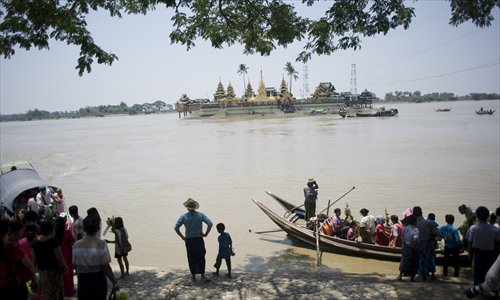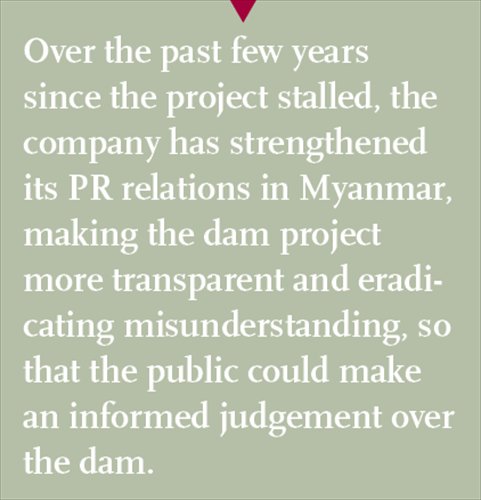Chinese firms seek to restart suspended projects after Myanmar’s transition
The Myitsone hydropower plant, a China-invested project in Myanmar, has been under a dark cloud since it was abruptly suspended five years ago. After Myanmar elected its new government late last year, Chinese investors have had their hope that the project might go ahead renewed. However, considerable local concerns over transparency and the dam's environmental impact have not yet been dispelled.

People board ferries to go to the Kyaik Mhaw Wynn pagoda on the outskirts of Yangon, Myanmar, on April 19. Photo: AFP
A new and hopeful chapter has begun in Myanmar after the transfer of power to the new civilian-led government. Expectations are running high for the administration led by the National League for Democracy (NLD) not only from the segments of Myanmar eager to see further changes, but also the representatives of Chinese investors.
"We hope the Chinese and Myanmese governments will continue to promote the resolution of the suspended Myitsone Dam project," said Jiang Lizhe, deputy director of the Department of Public Affairs of the Upstream Ayeyawady Confluence Basin Hydropower Co. Ltd (ACHC), a Sino-Myanmar joint venture that manages hydropower resource development in Myanmar, to the Global Times.
"We are full of expectations about the new government of Myanmar, hoping it can make a decision that tallies with the demands of Myanmar and bilateral economic and trade win-win cooperation," Jiang added.
On September 30, 2011, then Myanmar president U Thein Sein abruptly announced that work on the Myitsone Dam, a hydroelectric mega-project with a total investment of $8 billion from the China Power Investment Corporation (CPI), would be suspended in the name of "the people's will," until the end of his term. Since then, there has been perennial speculation over the final fate of the dam.
At that time, public opposition to the project was soaring, with some NGOs and activists launching verbal attacks on the dam. There was a perception that the deal with China was signed by the military government at the cost of the interests of Myanmar people.
"Varied parties were wrestling with each other during Myanmar's democratic transition, the dam suspension helped boost Thein Sein's reputation both home and abroad," Bi Shihong, professor at the School of International Studies at Yunnan University, told the Global Times.
Myanmese author Thant Myint-U held that suspending work on the dam was "the best sign" that the Thein Sein government was serious about reforms, he was quoted as saying by the BBC in 2011.
The project has only been suspended, not cancelled. The new government has to face the conundrum of the Myitsone dam and make a decision. On March 8 at a press conference held at the sidelines of the Fourth Session of the 12th National People's Congress, Chinese Foreign Minister Wang Yi said China and Myanmar will continue to handle the matter "in an active and appropriate way," emphasizing that "The Myitsone Dam is a commercial project that has cleared all the approval procedures."
Before the new government took office, U Hantha Myint, the head of the NLD's economics committee, told AFP in March that a potential redesign, or even relocation, of the Myitsone project in northern Kachin State was on the cards. The trained engineer mentioned the dam's proximity to an active earthquake fault line, but said a compromise could be made to reduce risk. Instead of building a dam at Myitsone, "we can build other dams upstream," he said. But a few days later, NLD spokesperson Zaw Myint Maung said the government would listen to the public before making its next move.
In the April 5 press conference after Myanmar Foreign Minister Aung San Suu Kyi met her Chinese counterpart Wang Yi, Suu Kyi said the project had not been discussed, adding that she had yet to examine the contract.
"The NLD-led government cannot reverse this decision in the short term." Bi Shihong, professor at the School of International Studies at Yunnan University, told the Global Times. "But rational dialogues should be kicked off to solve the conundrum," Bi added.

Lighting Myanmar
"The Myitsone dam project should be restarted," said Dan Steinbock, a global economic and policy analyst and partner of consulting firm Difference Group. He stressed that energy projects are vital not just for China, but for Myanmar's economy and the government.
Years of economic sanctions have crippled Myanmar's economy, and the new government is facing formidable economic challenges. Statistics from the World Bank show that 84 percent of households in rural Myanmar now live in the dark, creating hardship, perpetuating poverty and stalling development. "Given Myanmar's lack of coal or advanced alternative energy technology, its abundant water resources are undoubtedly nature's gift and a more economic and feasible choice for clean power generation," Bi said.
According to ACHC, the Myitsone Dam is the largest of the seven hydropower stations to be built under the Sino-Myanmar Framework Agreement on Joint Development of Hydropower Resources in Myanmar signed in March 2003. The seven dams will have a total installed capacity of up to 20,000 megawatts. Based on the agreement, about 60.7 percent of the return on investment will go to Myanmar, including free supply of 10 percent of electricity produced and 15 percent of the joint venture's free equities and tax revenue.
Jiang told the Global Times that the Myitsone Dam, once completed, will generate nearly 30 billion kilowatt hours of electricity every year, three times more than Myanmar generates annually now, which will be of great help to solve the power shortage, improve infrastructure and boost employment as well as national economic development.
U Win Myo Thu, a Myanmese environmentalist, told the Global Times that Chinese scholars and the ACHC are overemphasizing the dam's economic value, and they don't understand Myanmese people "always prioritize freedom and identity" as their founding father historically established.
Aung Tun, a Myanmese commentator, told the Global Times that there are still many anxieties over the dam project in Myanmar. He claimed that the project lacks transparency and accountability, people are uncertain about how the project will affect the livelihoods of the residents of areas around the Ayeyarwaddy River and the nation as a whole, and that China is negatively viewed by the Myanmese public because of its past relationship with the military junta and "ignoring the public pursuit of democratic change."
Jiang said over the past few years since the project stalled, ACHC has strengthened its PR relations in Myanmar, making the dam project more transparent and eradicating misunderstanding, so that the public could make an informed judgement over the dam.
A problem-solving model
Myanmar's democratic transition has caused uncertainties over foreign investments, with Chinese-invested projects bearing the brunt. Besides the Myitsone Dam, the joint Myanmar-China project to develop the Letpadaung copper mine was also temporarily halted because of opposition from local residents aided by activists and opposition parties. Suu Kyi chaired a commission to probe into the project and after a three-month investigation, the commission recommended construction be allowed to continue should actions be taken to reduce the adverse impact of the project on local communities. "If we stop this project, it will not benefit local people or the country," Suu Kyi said.
"The commencement and resumption of the Letpadaung copper mine project shows that there is a possibility the Myitsone Dam project might be restarted as long as the project wins the support of the people," said Sameh El-Shahat, president of China-i Ltd, a risk and communication advisory company based in Beijing and London. El-Shahat suggests the Chinese company adopt a social risk management strategy, aligning with community needs and concerns, applying strong social and environment safeguards which involve locals, and providing meaningful change and benefits to them through a process of engagement.
"There is an excellent opportunity for the dam to become a model project for other hydropower projects. An excellent opportunity for China and for the new government in Myanmar to create a multi-layered strategy of working with different stakeholders to get them involved," El-Shahat emphasized.
Chinese investment needed
Official statistics show that from 1988-2015, Myanmar received $54.2 billion in foreign direct investment (FDI) from 38 countries and the country aims to attract $6 billion in FDI in the 2015-16 budget year.
China remains the biggest investor in Myanmar, with 74 Chinese companies having invested $14.8 billion. Earlier this month, it was reported that the Chinese State-owned commodity trader Guangdong Zhenrong Energy won approval from the Myanmar Investment Committee to build a $3 billion refinery in the southeast coastal city of Dawei in partnership with local parties.
Before Union Planning and Finance Minister U Kyaw Win officially assumed his position, he stressed economic growth is Myanmar's top priority in an interview with the Myanmar Times in late March.
"It's impossible for the new government to alienate Chinese capital," Steninbock said.
"The Myitsone dam is not just about China. It is also about the future of foreign investment in Myanmar. The new government cannot ignore the legal validity of past agreements and must find a way to satisfy international investors even as it tries to satisfy regional concerns," He added.
Newspaper headline: Dam conundrum